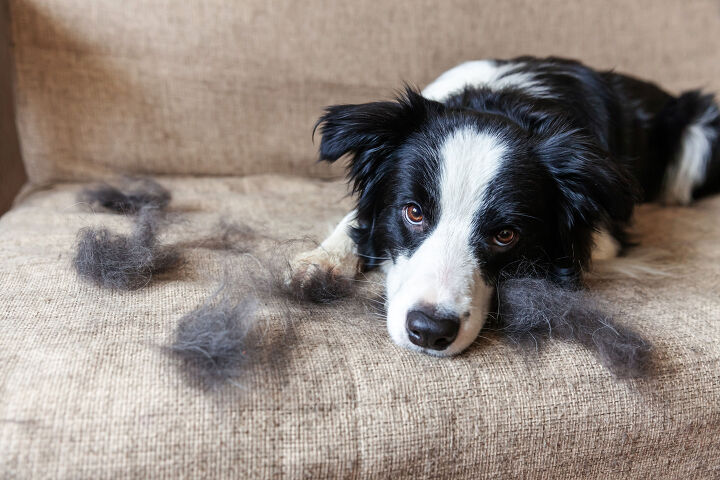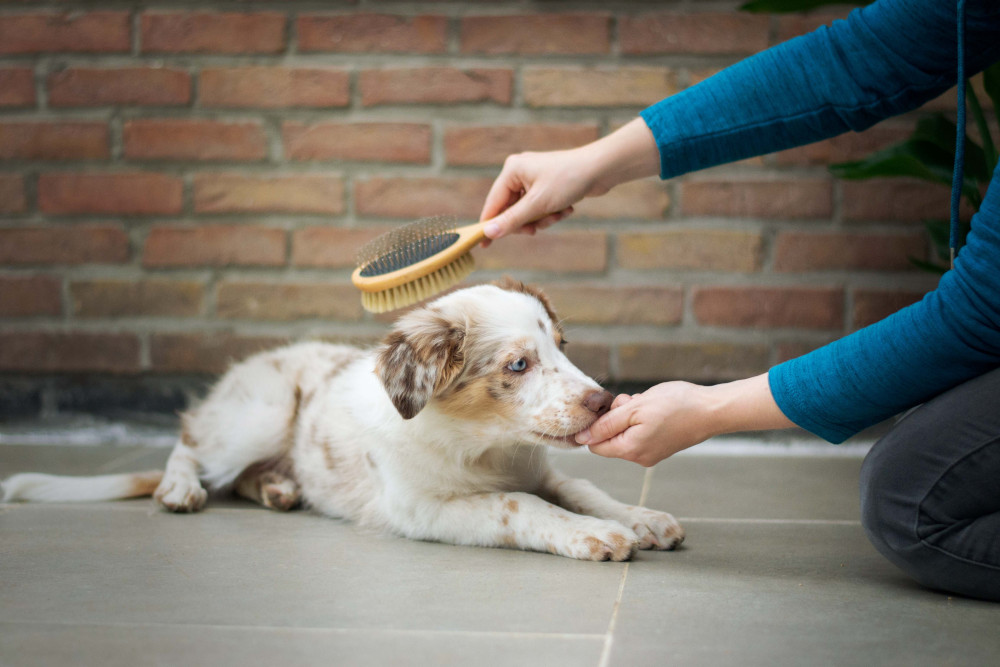KEY TAKEAWAYS for Dog Owners
- Grooming keeps dogs clean, healthy, and comfortable.
- Include brushing, bathing, nail trimming, and ear/teeth care.
- Grooming needs vary by breed, coat, and activity level.
- Professionals offer convenience; DIY saves money with the right tools.
- Large dogs need heavy-duty gear
- Sensitive skin? Use gentle, fragrance-free products.
- Start grooming puppies early with soft brushes and mild shampoo.
- Use proper brushes, paw cleaners, and nail tools.
- Dog paw balms can help soothe and moisturize dry and cracked skin on paws.
- Maintain dental, ear, and eye hygiene regularly.
- Avoid human products and choose the right tool size.
- A well-groomed dog is a happy, healthy 4 legged friend!

(photo credit: Julie Zavalishina / shutterstock.com)
Why Grooming Your Dog is Important
Grooming is essential not only for your Fur Baby's appearance but also for their overall welfare and comfort. Regular grooming helps to prevent painful matting, skin infections, and detects any abnormalities such as lumps, bumps, or parasites early. It also reduces shedding and keeps your dog’s coat clean and shiny. Grooming sessions provide an opportunity to check your dog’s ears, eyes, teeth, and nails, ensuring they are healthy and free from infections or injuries.

Grooming the dogs in your care is important. It’s not just about making them look fabulous — it’s about keeping them happy, healthy, and feeling their absolute best.
How to Groom Your Dog Properly
Effective grooming involves more than just a bath. It includes brushing your dog’s coat regularly to remove loose hair and prevent tangles, bathing them as needed with doggo-friendly shampoos, trimming nails carefully, and cleaning ears to prevent infections. When grooming, use appropriate tools such as brushes suited to your dog’s coat type and size. Always be gentle and patient, offering treats and positive reinforcement to make grooming a stress-free experience.
Dog Grooming Frequency and Needs
Breed Type:
Short-haired breeds may need less frequent grooming than double-coated or long-haired breeds.
- Examples of short-haired breeds: Beagle, Boxer, Dalmatian
- Examples of long or double-coated breeds: Golden Retriever, Siberian Husky, Shih Tzu
Coat Condition:
Dogs with curly or wire-haired coats often require specialized grooming to prevent mats and tangles.
- Curly-coated breeds: Poodle, Bichon Frise, Portuguese Water Dog
- Wire-haired breeds: Wire Fox Terrier, Airedale Terrier, Brussels Griffon
Size and Activity Level:
Large dogs or those who enjoy outdoor activities may need more frequent cleaning, especially after walks, hikes, or playtime.
- Large, active breeds: Labrador Retriever, German Shepherd, Bernese Mountain Dog
- High-energy outdoor dogs: Border Collie, Australian Shepherd, Jack Russell Terrier
Seasonal Changes:
Shedding increases during seasonal transitions, demanding extra brushing and rinsing to control loose hair and keep coats healthy.
- Heavy seasonal shedders: Alaskan Malamute, Akita, Corgi (Pembroke or Cardigan)
- Other seasonal shedders: Newfoundland, Great Pyrenees, German Spitz
Professional Grooming vs. At-Home Grooming
Dog owners often wonder whether to choose professional services or manage grooming at home. Professionals can offer breed-specific trims, use foaming cleansers for deep cleaning, and safely handle sensitive areas like ears and nails. At-home grooming, while more affordable, requires time, tools, and patience. Mobile groomers offer a convenient in-between option for busy pet owners.
Other Dog Care Essentials Beyond Grooming
Good grooming goes hand-in-hand with other aspects of pet health:
- A well-balanced diet impacts coat shine and skin health.
- Regular walks stimulate circulation and reduce shedding.
- Vaccinations and vet visits catch potential issues early.
- Paw and nail care prevent dirty paws from damaging your floors or furniture.
- Basic training ensures grooming is a smooth process for you and your pup.
Grooming Tips by Breed
Each breed has unique grooming needs. Small dogs like Yorkies need frequent trims, while large breeds like Golden Retrievers benefit from weekly undercoat raking. Breeds with thick fur, such as Huskies, may need tools like the SteamPup Brush or other deshedding tools to manage shedding.
Specialty Grooming Product Segments
Grooming for Large Dogs
Large dogs have more surface area and often get dirtier, especially after hikes or muddy paws. Tools like oversized dog paw cleaners or paw washers are essential. Pair with extra-absorbent towels, heavy-duty nail clippers, and soft bristles to handle thick fur gently.
Sensitive Skin or Allergies
For dogs with sensitivities, opt for organic shampoos, fragrance-free foaming cleansers, and silicone bristles that don’t scratch the skin. Monitor for redness, flaking, or itching, and avoid products with artificial dyes or parabens.
Puppy Grooming
Start young to build positive associations. Use smaller size brushes, tear-free shampoos, and grooming kits designed for puppies. Puppies’ skin is delicate, so look for soft bristles and avoid harsh soaps.
Types of Grooming Tools
Rover Rituals grooming/care products:
SteamPup Brush - Steam Powered Deshedder / Slicker Brush
PuffPaw 3-in-1 dog grooming / massaging brush
PawSpa - Automatic Dog Paw Washer / Muddy Paw Cleaner
Natural Dog Grooming Shampoo and Conditioner
PawJet - Ultimate Bath Sprayer
FurGone Broom - Dog Pet Hair Remover Tool
ScooPup Dog Pooper Scooper
Dog Bathing Brush with shampoo dispenser
Brushing & Deshedding Tools
- Slicker brushes for detangling.
- Pin and bristle brushes for finishing.
- Undercoat rakes for shedding breeds.
- Grooming gloves for gentle brushing.
- Tools designed with dog owners in mind for better grip and customer satisfaction.
Washing & Bathing Products
- Shampoos for different needs: anti-fungal, medicated, and for sensitive skin.
- Dry shampoos or foaming cleansers for quick clean-ups.
- Dog wipes for mud, sand, or snow after a trip to the beach.
- A cup or container for easy rinse.
- Don’t forget a towel to dry off paws and prevent dirty water from spreading. And patting your dog's paws dry after cleaning prevents water from tracking into your home.
Automatic Dog paw washer / Dog paw cleaners / Muddy Paw Cleaners
Portable paw cleaning devices are designed for convenience during outdoor activities with dogs. Electric paw cleaners can effectively clean dog paws without hand scrubbing.
The PawSpa will clean those muddy paws in seconds, saving your floor and stress levels! For those looking for an automatic dog paw washer, the PawSpa offers a convenient and effective solution. It’s a great dog foot washer, ensuring every part of your dog’s paws is cleaned thoroughly. Whether after a muddy walk or a day at the park, the PawSpa Dog Paw Cleaner is your go-to tool for maintaining clean paws.
Moisturizing balms can help soothe dry or cracked paws after cleaning.
Drying Equipment
Use a pet blow dryer or drying mitts to avoid leaving your dog damp—this can attract bacteria or cause irritation. Dogs with longer fur or double coats especially need thorough drying.
Nail & Paw Care Tools
Paw care is more than just a quick wipe. Use:
- Nail grinders or clippers to prevent painful splits.
- Paw balms to protect against hot pavement or salt.
- A muddy paw cleaner or pet foot cleaner to trap debris before it enters the house.
- Products in three sizes to ensure the right size fit.
Ear & Eye Care Products
Keep ears and eyes clean with:
- Gentle ear solutions.
- Eye wipes for tear stains.
- Avoid harsh soaps near the eyes and use a soft towel to pat dry.
Dental Care Products
Bad breath and plaque? Use:
- Dog-safe toothpaste.
- Finger or angled toothbrushes.
- Dental chews that dogs enjoy like a treat.
- Water additives for ongoing oral health.
Trimming & Grooming Kits
Complete your at-home setup with:
- Rounded-tip scissors.
- Quiet clippers for jumpy dogs.
- Combs for dematting or flea checks.
Considerations for Large Dogs
- Choose larger cups for rinsing.
- Use long-handle brushes or paw washers.
- Be prepared for extra cleaning, especially if your dog likes to dig!
Effective Cleaning Techniques
Always use warm water and rinse thoroughly to avoid residue. Towel dry paws immediately after using a muddy paw cleaner. To avoid floors getting dirty, place a muddy paw mat near the door. Use soap sparingly, and choose gentle formulas to protect your dog’s skin and pads.
Common Mistakes to Avoid
- Using human shampoo (not pH balanced for dogs)
- Skipping nail trims (which can affect gait and feet)
- Ignoring paws, especially in rainy or muddy conditions
- Not choosing tools based on dog size or coat type
Summary
Proper dog grooming isn't just about appearances—it’s essential for your dog's health, hygiene, and comfort. From using a dog paw washer to selecting a soft brush, tailoring your routine to your pet’s breed, size, and sensitivities makes all the difference. With the right tools, techniques, and products, you’ll keep those paws, ears, and coats clean—and your best friend feeling their best.
Dog Grooming FAQ
Q: How often should I groom my dog?
A: It depends on the breed, coat type, and activity level. Most dogs need brushing a few times a week and bathing every 4–8 weeks. Large breeds or active dog owners may need more frequent grooming.
Q: What’s the difference between a dog paw cleaner and a paw washer?
A: Both clean your dog's paws, but a dog paw washer usually has a cup-style design with soft bristles or silicone bristles inside. A dog paw cleaner may be a wipe, mat, or cup—choose based on your dog's paw size and how dirty they get.
Q: Are paw cleaners safe for sensitive skin?
A: Yes, most paw cleaners are designed with soft bristles and can be used with foaming cleansers or just warm water. For dogs with skin allergies, use fragrance-free or natural products.
Q: What tools do I need for at-home grooming?
A: Basic tools include a brush, nail clipper or grinder, dog shampoo, paw cleaner, and dog wipes. Optional but helpful: grooming gloves, drying mitts, and toothbrushes.
Q: How do I clean muddy paws after a walk?
A: Use a muddy paw cleaner, rinse with warm water, and dry with an absorbent towel. Keep a mat near the door to protect floors from mud and dirt.
Q: Can I use human shampoo or soap on my dog?
A: No. Human products can irritate a dog’s skin and disrupt pH balance. Always use a dog-friendly foaming cleanser or shampoo.
Q: What size paw washer should I get?
A: Check the product's three sizes guide and choose based on your dog’s paw width. Large dogs typically need bigger cups, while small dogs and puppies need compact versions.
Q: How do I get my dog used to grooming?
A: Start early, be gentle, use treats, and keep sessions short. Tools with soft bristles or grooming gloves can help reduce stress.
Q: What’s the best way to clean between my dog’s toes?
A: Use a paw washer with gentle bristles to reach between toes and pads. Follow with a towel to dry and check for debris or irritation.
Q: Do I need different products for puppies?
A: Yes. Puppies need mild shampoos, smaller size brushes, and gentler tools to protect their delicate skin and paws.









































